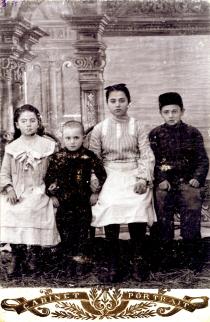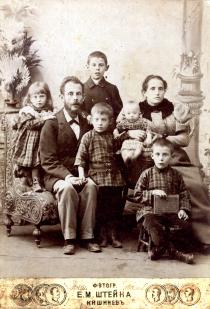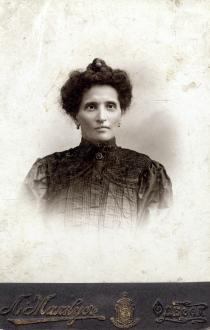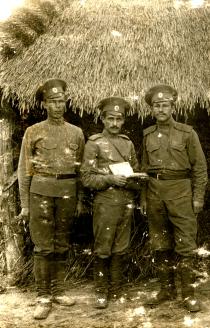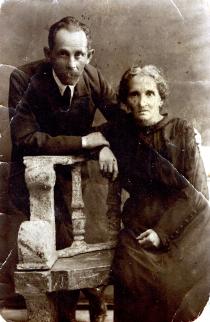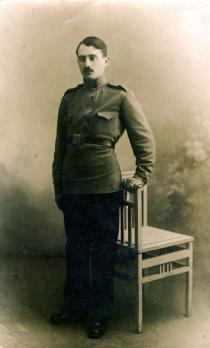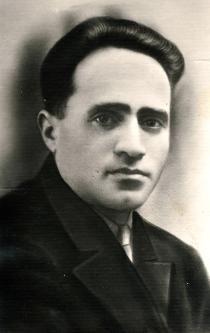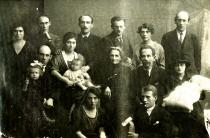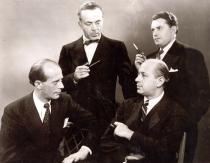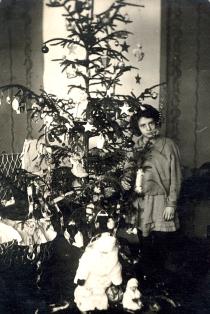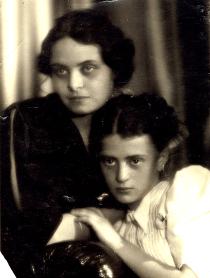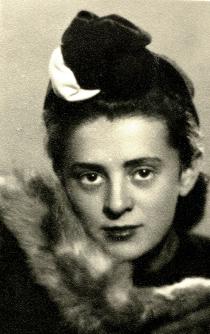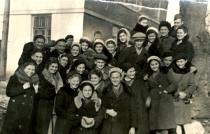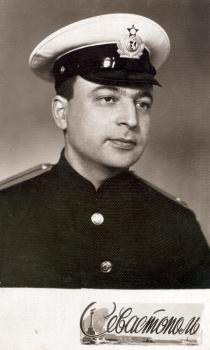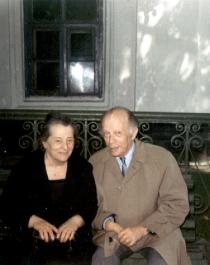My music teacher, Liya Hinchin, with me, Larissa Khusid, in Kiev in 1940.
I was very fond of music. I also studied French and German and went in for skiing. We often attendedconcerts at the Philharmonic, and to the theaters. In 1939 I became a Komsomol member . It was such an important event in my life that I still remember the number of my Komsomol membership card. I was also involved in public activities, as Chairman of the Education Committee.
In 1949 I finally felt myself a Jew. On April 13, 1949 a meeting was held at the House of Arts to discuss the issue of rootless cosmopolites, as they were called then. Most of our teachers at the Conservatory were Jews: Liya Hinchina, my teacher before the war, and Maria Gelik, Frieda Azrova, Ada German, brother Abram, Matvey Rozenpud, and others. At this meeting Andriy Malyshko, a Soviet Ukrainian poet and many others posed accusations against the ?rootless cosmopolites.? I remember that Malyshko called Hinchin and Gelik brood hens from the stinking nest of Olhovskiy. Olhovskiy was professor and a student of Asafiev, a great composer. He stayed during the occupation and left later for America. Hinchin and Gelik were his students.
I was Deputy Secretary of the Komsomol Committee. The Secretary of the Committee was Zhenia, a young Russian man. The rest of the Komsomol Committee consisted of Jews: Lenochka Yampolskaya, Zhora Grinberg, etc. We were all stunned by the goings on in the meeting, and were in the cloakroom when we saw Mariana Gelik going downstairs. She had poor eyesight and had lost her glasses, and I saw that she was about to fall. It was clear that she and the other Jewish teachers were broken and destroyed. I helped her to get her coat and put it on. When I came to the Conservatory the next day, there was another meeting of the Komsomol committee which expelled me from the Komsomol. There was only one vote against me, Zhenia?s. He explained to me that because I had helped a cosmopolite to put on her coat, that meant that I shared her views. A few days later, I was expelled from the Conservatory. This happened a half a year before my graduation. All the Jewish teachers were fired, of course. I felt terrible about what had happened. I stayed at home for about three weeks. Then a friend came to see me. She said ?Lialka, the Investigation Commission of the Central Committee of the Communist Party arrived in Ukraine. They ordered that you be reinstated to the Conservatory. So I was back at the Conservatory. Lena and I kept visiting Liya Yakovlevna Hinchin. We disguised ourselves under shawls and veils, but somebody reported us to the Conservatory, saying that we went there to take classes. One day, Lena Yefremova and I were called to the office of Skoblikov, the secretary of the Party unit. He interrogated me. ?Do you visit Hinchin?? he asked. I answered, ?Yes.? ?Are you writing your diploma with her?? ?Yes.? ?Who else visits her?? It suddenly occurred to me to name people whom he couldn't punish because they were not Jews and who were very influential members of the Communist Party. I said, ?Grigory Egorovich Veryovka and Eleonora Pavlovna Skrebchinskaya.? He said, ?You may go now.? He interrogated Lena in the same manner. When we were taking our state exam, there was a commission of twenty-four examiners sitting at the long table. Our first exam was on Marxism-Leninism. Lena and I had studied 103 items of their works. I got my exam card and spoke for one and a half hours. Then I fainted, and fell unconscious from the chair. As I regainded consciousness, I heard Avievskiy, the Head of the Department, saying, ?Give her some water and let her go on.? I said, ?I don?t need water, I shall go on answering.? We passed all four exams and defended our diploma work with the highest grades. After it was all over, Boris Nikolayevich Liatoshynskiy, a Ukrainian composer and a very educated and intelligent man who was also declared a cosmopolite, met us in the long, wide hallway and said, ?I know that you will now take flowers to Liya Yakovlevna. Give my regards to her, and tell her that you passed your test in exactly the way appropriate for her students.?
Liya Yakovlevna couldn't find a job in Kiev, so she left for Novosibirsk. Many cosmopolites went to different towns and cities, looking for jobs.

